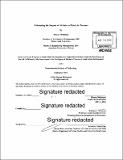Estimating the impact of Airbnb on hotels in Toronto
Author(s)
Mohamad, Hassan, S.M. Massachusetts Institute of Technology
DownloadFull printable version (15.90Mb)
Other Contributors
Massachusetts Institute of Technology. Center for Real Estate. Program in Real Estate Development.
Advisor
William C. Wheaton.
Terms of use
Metadata
Show full item recordAbstract
The sharing economy is disrupting long-standing industries! This is one of the most common phrases used in discussions about any of the booming internet-based companies offering peer-topeer services. This public perception fed by thousands and thousands of supporting articles and blogs seems intuitively correct. However, the limited number of empirical academic studies published to date, looking only at the direct impacts on the industry under review and ignoring the more holistic indirect economic impacts, have not all reached that same conclusion. In our study we focus on Airbnb, the company that went from renting 3 air beds in a San Francisco apartment in October 2007 to a valuation of $25.5 billion in 2015 surpassing the market cap of the largest global hotel chains that have been around for decades. The purpose of the study is to empirically estimate the impact of Airbnb on hotels in Toronto since majority of the limited academic empirical studies on the topic to date are focused on U.S. cities. Regression analysis of time series is used to estimate the structural models based on hotel performance metrics, GDP, CPI, tourists, currency, and Airbnb data. The three estimated models are: change in real average daily rate, change in hotel rooms available, and change in hotel rooms sold. We project a five-year forecast of Toronto hotels key performance metrics, for the period between January 2016 and December 2020, using the estimated models. The results of the study suggest that Airbnb has a statistically positive impact on the change in number of hotel room nights sold in the overall Toronto market. Taking a closer look into each of the six hotel classes the study hypothesizes that midscale class hotels are the only ones statistically significantly negatively impacted by Airbnb growth. Results also suggest that Airbnb growth has a statistically insignificant impact on the number of luxury, upper upscale, and economy class hotel room nights sold whereas upscale and upper midscale class hotels are positively impacted. We end our study with sensitivity analyses on the forecasts by altering one of the key assumptions at a time and estimating its impact.
Description
Thesis: S.M. in Real Estate Development, Massachusetts Institute of Technology, Program in Real Estate Development in conjunction with the Center for Real Estate, 2016. Cataloged from PDF version of thesis. Includes bibliographical references (pages 61-62).
Date issued
2016Department
Massachusetts Institute of Technology. Center for Real Estate. Program in Real Estate Development.; Massachusetts Institute of Technology. Center for Real EstatePublisher
Massachusetts Institute of Technology
Keywords
Center for Real Estate. Program in Real Estate Development.